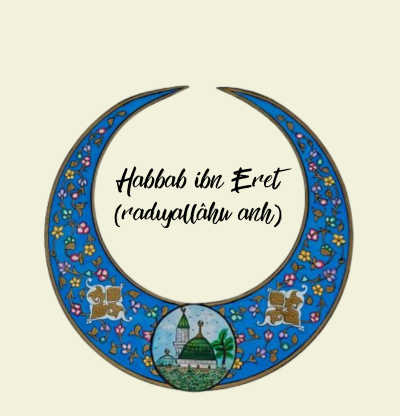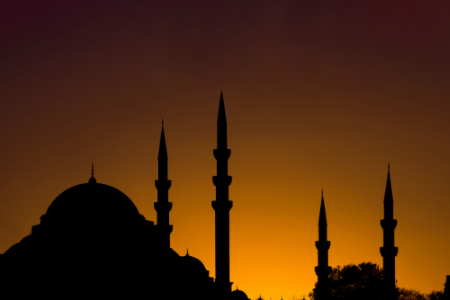In Mecca, a scorching heat dominated. There were those who suffered under the sun. Amidst the darkness, a light had shone and began to illuminate its surroundings. The Messenger of God (peace and blessings be upon him) had come to cleanse people’s hearts, to stop the evils and ugliness, to announce the truth to all humanity.
Hearts in search of truth, those that hadn’t been swallowed by darkness, found their solace next to the Messenger of God. It felt as though they had been deprived of air for an eternity, only to finally breathe in fresh oxygen. Among them, there was a beacon of unwavering resolve, a master blacksmith, and a slave whose devotion to the path of Truth knew no bounds.
He had heard the call of the Pride of the Universe. At that time, embracing Islam was difficult. It was even harder for a slave, for he had no family or tribe to stand behind him.
When the polytheists heard that this slave had become a Muslim, they went mad. They pressed hot irons onto his body; they left him to scorch under the burning sun. They did as much evil as they could, but he never compromised, declaring there was no deity but Allah (may He be glorified and exalted) and that Muhammad (peace and blessings be upon him) was His Prophet.[1]
O Habbab, you were that fortunate slave! Patience was you, perseverance was you!
No matter what happened, no matter what came our way, there was no turning back from this path! One would not knowingly enter the wrong path! There were many trying to deter us from the right path, to slip us up, but we had to withstand them all!
As ibn Wail owed you money. One day you went to ask for your due, but he said, “I will not pay you until you deny Muhammad!” You replied, “I would give up everything, yet I would never deny him, not until I die and even after I am resurrected!” Afterwards, this polytheist mockingly mentioned he would pay you in the Hereafter.[2] Upon this, God Almighty informed, through Gabriel (peace be upon him), of the torment that the oppressive polytheists would suffer.[3]
One day, you went to the Messenger of God, asking for a prayer to end the tortures. God’s Messenger was already aware and deeply affected, yet he was patient. Great causes required great sacrifices. One had to clench their teeth, not falter in the face of evil. The Messenger of God said to you, “By God, this religion (i.e. Islam) will prevail till a traveler from Sana (in Yemen) to Hadrarmaut will fear none but Allah, or a wolf as regards his sheep, but you (people) are hasty.”[4] These promising words were an invitation to patience, emphasizing perseverance.
Especially in the early days of Islam, there was great hostility towards Muslims. Even figures like Umar (may God be pleased with him) were against Muslims before experiencing the peaceful atmosphere of Islam. Before becoming a Muslim, when Umar heard that his sister and brother-in-law had embraced Islam, he set out to confront them with severe anger. But an event that cooled his anger and melted his ice occurred. He heard your voice! He heard you reciting the Qur’an! It struck him profoundly. Despite entering into a rage, his anger eventually subsided. You were teaching the newly converted Muslims to read the Qur’an, reciting the chapter Ta Ha. When he arrived, they quickly hid you. After calming down, Umar asked about what he had heard. Coming out from your hiding, you explained Islam to him and recited the verses. Through this, Umar too was guided to the truth.[5]
Islam was spreading day by day. The oppression of the tyrants continued. The path to migration to Medina became clear. You participated in this migration and made all necessary sacrifices throughout your life, O Habbab!
You bore the scars of torture on your back for your entire life. They were a remembrance of those harsh years. You fell ill in Kufa and walked towards the horizon of your soul. You had lived a life full of trials, but the rewards awaited you in the hereafter. You were among those who were patient, those who did not falter in the face of hardships.
Your Funeral Prayer was led by the honorable Ali (may God be pleased with him), and he prayed for you at your grave.[6]
You have met your Lord. The pain has ended, and the trials are over. Endless happiness awaits you. O steadfast Companion, who is an example of patience! O indomitable person!
[1] Ibnu’l-Athir, Usdu’l-Ghaba, 2/102; Ibn Sa’d, Tabaqat, 3/164–165; Ibn Hajar, Isaba, 2/258.
[2] Ibn Sa’d, Tabaqat, 3/164–165.
[3] Maryam, 19/77–80.
[4] Bukhari, Sahih, 4/238–239.
[5] Ibn Ishaq, Sira, 160–163; Ibn Hisham, Sira, 1/343–346; Ibn Sa’d, Tabaqat, 3/267–269.
[6] Ibnu’l-Athir, Usdu’l-Ghaba, 2/100.




